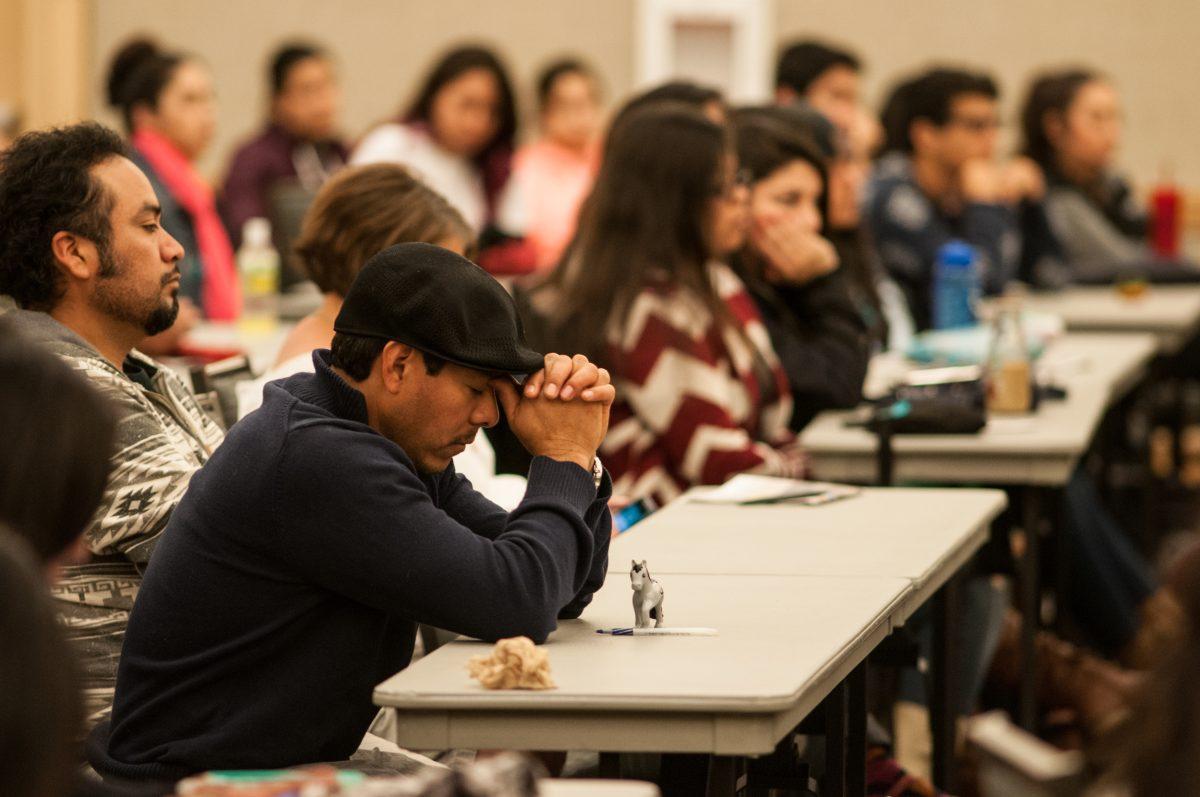The room overflowed with members of the community and students as the Caravana 43 gave their testimonies on the 43 missing students from Guerrero, Mexico, and their stories of abductions, poverty and government corruption.
The purpose of the event is to shed light on what many consider a corrupt government, and protest the Merida Initiative, an agreement between the United States and Mexican government and allocating funds to aid in the war against corruption and organized crime.
“The most important things to say about this event are that the Mexican government’s version of the story, that the students are dead have not been extensively proven,” said Joseph Persico, member of the Comite por la Justicia (committee for social justice in Mexico) and alumni of Sonoma State“The Mexican government wants to sweep us under the rug, There have been no evidence shown except for a extracted tooth and part of a finger.”
Persico also went on to say, “Obviously, you don’t have to kill somebody to take tooth or their finger.”
Six Students of Raúl Isidro Burgos Rural Teachers’ College of Ayotzinapa in Iguala, Guerrero, Mexico were shot dead by local police, and 43 were abducted in September when on route to protest a conference of the mayor’s wife.
The caravan included Bianca Luz David Valez, Estanislao Mendoza Choclate, Jasmin Arla de Cruz and Angel Neri de la Cruz Ayala, classmates and parents of the deceased and missing.
Shortly after the start of the public forum for the “Caravana 43,” the location of the forum switched to a larger room of Sonoma State’s Grand Ballroom; which could accommodate about 200 people.
“We are not any different from the students of Ayotzinapa, we need to stand in solidarity,” said Griselda Madrigal, Junior at Sonoma State, majoring in Chicano and Latino Studies. “We are living in the U.S. but what is happening in Mexico is affecting us too and we cannot be indifferent.”
Sonoma State was just one of the three visits the caravan planned in the San Francisco North Bay on Tuesday. There was a college welcome for the caravan at Santa Rosa Junior College earlier that morning, the visit to Sonoma State at noon, and another forum at the Labor Center of Carpenters in Santa Rosa later that night.
The visit to Sonoma State was not by coincidence, but organized by members of the Comite por la Justicia de Mexico and by students in MEChA of Santa Rosa Junior College and of Sonoma State.
The caravan for the 43 missing students that visited is not the only effort being made by the parents, family and friends of the missing students. The caravan is one of three caravans driving through the United States in April.
The three caravans divided the United States in three sections, Pacific Region, Central Region and Atlantic Region. The pacific region caravan, which one visited Sonoma State is touring through six other states other than California.
“They are raising awareness on how they can have people connect and continue the support as a whole movement,” said Argelio Giron, studying Chicano and Latino Studies at Sonoma State, “and to pressure the U.S. government to stop the Merida initiative.
Since 2008, the U.S. Congress has appropriated 2.3 billion dollars in funds for Mexico and the war against drug and government corruption.
The initiative consists of four pillars. First pillar, disrupt the capacity of organized crime to operate. Second, institutionalize to sustain rule of law. Third, create a 21st century border structure and forth, build strong and resilient communities.
Pillar one, focuses on disrupting the capacity of organized crime by means of training, communications and militarizing the Mexican military and federal government. Since 2008, the Mexican government has received four CASA 235 maritime surveillance aircrafts, at a cost of $50 million each, nine UH-60 black hawk helicopters, and creating a cross-border telecommunications system between 10 United States and Mexico border sister cities.
Much criticism has surfaced about the initiative, intended for the Mexican government to combat organized crime and government corruption is actually going to the drug cartels themselves.
“These representatives [Caravana 43] say that those tools [Merida Initiative] are being used to repress the very same people that it’s suppose to protect,” said Giron.



































